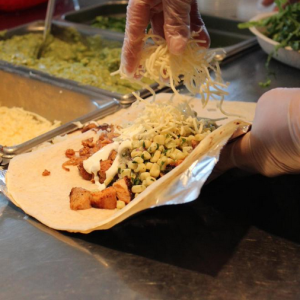Customers at 600 Chipotle locations in 20 states recently learned that the company has a new definition of pulled pork: Not available here.
According to the chain, one of its pork suppliers failed to meet the company’s pig-rearing standards, and so a massive shortage of pork began that has caused it to remove carnitas from one-third of its restaurants. Chipotle’s CFO blamed the move on a lower-than-expected sales report that recently sent its stock tumbling in after-hours trading.
While some Chipotle consumers are inevitably frustrated with the decreasing availability of pork, they would likely be even more agitated to discover how flawed and misguided the “animal welfare” standards are that resulted in the shortage in the first place.
Chipotle’s situation reveals a lot about the marketing of animal welfare—and the reality of it. Chipotle has long marketed itself as anti-Big Ag, the company’s “Food with Integrity” supposedly coming from more pastoral settings. The marketing resonates with consumers who don’t have experience in agriculture but do have a nostalgic desire to eat animals that are humanely raised. The problem is, Chipotle’s standards do not necessarily support animal welfare.
For example, Chipotle mandates that its pork suppliers cannot provide antibiotics to their animals. To state the obvious, to deprive an animal of medicine means that more animals are going to die. Chipotle’s standards are so extreme that a farmer can’t give his animals antibiotics even if a veterinarian signs off on it. There is nothing “humane” about withholding medicine from a sick animal any more than withholding medicine from a sick kid.
As Chipotle itself acknowledges in an annual report, “Herd losses can also be greater when animals are not treated with antibiotics and hormones.” No kidding. Too bad that fact isn’t in Chipotle’s ads. (And the term “antibiotic-free” meat is a misnomer. Antibiotics are subject to a withdrawal period which clears out the medicine if used in food animals.)
Chipotle also demands that its pork suppliers do not use individual maternity pens for the housing of pregnant pigs. While the use of maternity pens is a favorite target of the animal rights movement, the reality is these pens provide for animal welfare.
Maternity pens provide a safe enclosure for sows that protect the pregnant pigs from being attacked by other sows. It is for this reason that, in farms where sows are given the choice between individual pens or general housing, the majority of sows choose the safety of the pens. The American Veterinary Medical Association and the American Association of Swine Veterinarians have found that maternity pens provide for animal welfare.
In fact, recently a whistleblower from the Humane Society of the United States, a vegan activist group that criticizes modern farm practices came out and criticized the attacks on maternity pens. The whistleblower, who personally worked on pigs farms, stated that groups like HSUS “should be for (maternity pens) if they’re honesty, truly for animal welfare.” Chipotle should take note.
At the end of the day food production is, to no surprise, much more complicated than an ad campaign or a slogan. Most farmers—who are in a better position than a restaurant company to determine best practices—don’t abide by Chipotle production practices, so the supply is thin and Chipotle faces occasional shortages.
In fact, Chipotle seems to realize that its “Food With Integrity” is skin-deep. On occasions when the company has run out of chicken or beef, it has served conventionally produced meats—the stuff you’ll find at the supermarket and other restaurants. And customers are happy to keep buying the burritos.
Now that Chipotle has eliminated pork from a third of its locations, one has to wonder how this will further impact the restaurant chain. Chipotle banks on consumers believing that the higher cost, and diminished menu options, are worth the alleged benefits. The question is, what benefits?

